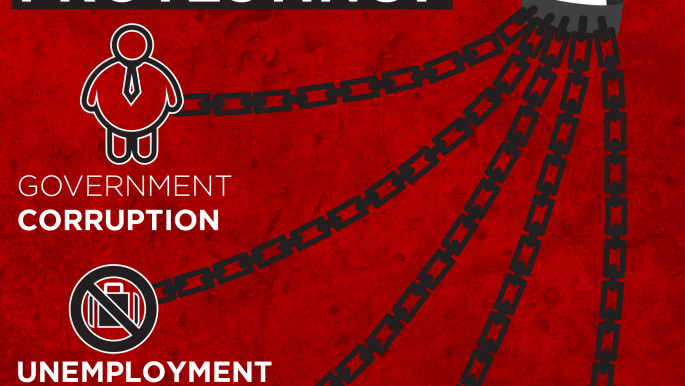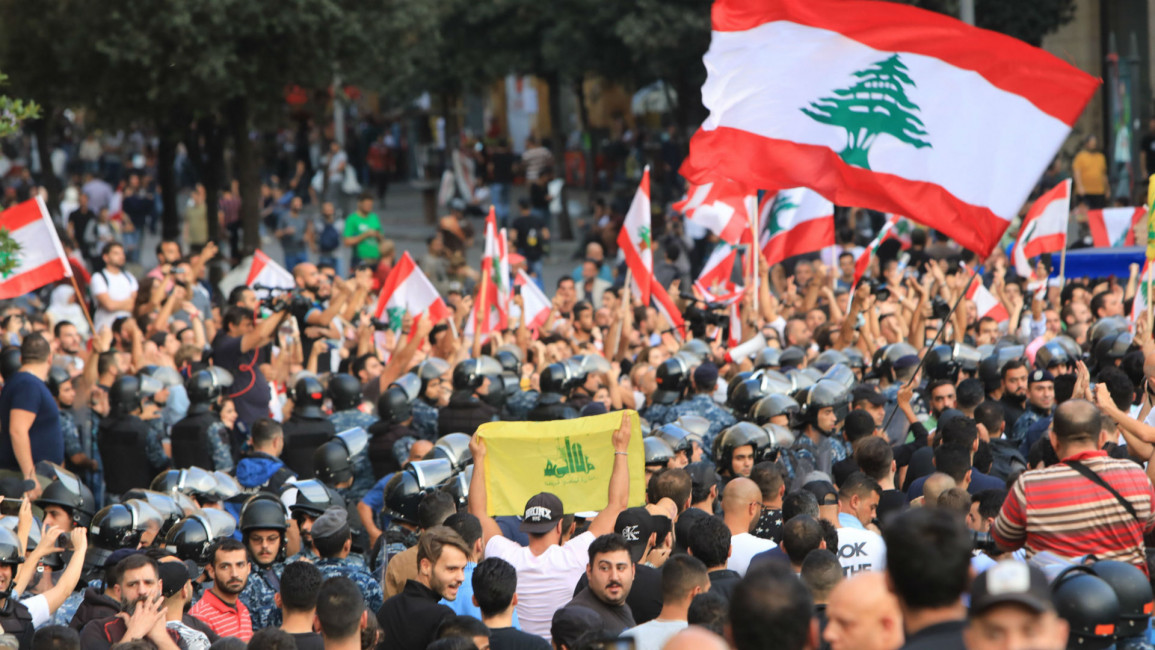
No longer on the fence: Hezbollah endorses the counter-revolution of the corrupt Lebanese ruling class
Why a minister whose portfolio focuses on the Lebanese education system needs armed thugs in the first place is anybody’s guess, let alone why he would need to dispatch them against his own people. But these are the sort of lessons dished out by the Lebanese ruling class: Their role is rule and ours is to fall in line.
What happened next, however, was the defining act of defiance in what is quickly becoming known as the Lebanese 'October Revolution'.
A woman confronted the bodyguard. She fearlessly placed her right foot firmly on the ground, shifted her weight, leaned back and thrust her left foot into the gunman's ribs. He flailed and the rifle, acting as an extension of his arms, went limp. The whole act was caught on video, meme'd in true Lebanese fashion, and turned into a symbol of the revolt.
For the past nine days, protestors flooded streets from Tripoli to Sour (Tyre) and from Beirut to Baalbek. In some parts of the country, the protests took on a party atmosphere, as videos went viral of protesters dancing dabke in Beirut, sunbathing in inflatable pools in Zouk, and raving at a popular square turned open air club in Tripoli. These celebratory acts are also acts of subversion - a message to the establishment that they can destroy their economy but they cannot destroy their spirit.
But on Friday, a new dimension was added to this popular uprising. A movement that had once been a popular uprising of its own impeded on protesters in Beirut’s Riad al-Solh square and brought with it less of a message and more of a goal. To sow fear and doubt.
The counter protesters were supporters of Hezbollah - the powerful Iranian-backed group that is part of the Lebanese government. The irony here doesn’t seem to be lost on many.
Hezbollah's followers demand the protesters respect the current government. The same government that Hezbollah has the power to disbar to subvert any time something goes against its best interest. As for the people on the streets, their best interest isn’t important.
 |
Since the civil war ended nearly 30 years ago, the ruling class his pitted the the populace against one another. They’ve used sectarian scare tactics and clientelism to convince their followers that they were the only ones who could fix the problems facing Lebanon. And if they couldn’t, they were at least better than the alternative party.
Recent events however have pulled the curtain back on all the lever-pulling wizards.
A recent period of austerity has been paired with a panic over shortages of US dollars and gasoline. Prime Minister, Saad al-Hariri shuttered his long running television station, giving many people who had long wondered if they’d receive their monthly salaries the certainty that next month they would not. But only 10 days later, the New York Times broke a story in which Hariri, a married father of three, paid an alleged mistress, a South African Bikini model, $16 million. Whether the money came from the state or his personal wealth, it’s hard to argue those are good optics.
Then came the worst wildfires the country had seen in decades. The wildfires spiraled out of control at least partially because officials allowed the equipment needed to fight them to rot away.
It didn’t matter to the ruling class that citizens and civil society have been alerting the government to the possibility of disaster for some time. Because ministers don’t live in the same reality as the rest of Lebanese society, so they swat them away, treating them as a minor nuisance, like flies circling their evening roast.
With the country having literally just been on fire, the ruling class decided to light one more match.
They rolled out a series of taxes including one on a free communication service relied upon by the country’s most vulnerable people. While some in the international media mockingly labelled this the 'WhatsApp Revolution', the truth is the degradation has been building for nearly 30 years. It’s unclear who thought these taxes were a good idea. What it shows is how disconnected the ruling class is from the people it is supposed to serve.
Read more: Radical reform or total chaos for Lebanon?
The protestors shed these shackles. Pleas from the president and the prime minister were not enough, nor were their myriad promises to impact change. Any faith or goodwill in the ruling class is as far out of sight as the tax money that goes into their private coffers.
The country’s citizens stopped looking up for help and started looking around for solidarity.
Lebanon’s wealth gap matches those of the world’s most unequal nations, according to the World Inequality Database.
The country’s richest 1 percent pulled in 25 percent of national income between 2005 - 2014 and the economy has only grown more dire in the last five years.
Unemployment for people aged 25 and under is at 37 percent. And rather than put policies or pass legislation to fix Lebanon’s rampant problems, the ruling class has taken to blaming refugees and attempting to levee taxes on its most vulnerable citizens. So the streets became a more appealing option than the indignity of the status quo.
This level of inequality is not new to Lebanon - particularly the areas outside the capital of Beirut. It was this inequality that allowed Hezbollah to grow like a mold in the darkness left by the Lebanese state’s shadow. The group thus emerged, in a revolution of its own, to reclaim the rights of the disenfranchised, and for many Hezbollah partisans, also reclaimed their dignity.
But the essence of a revolution, particularly if it is successful, is that it continues to fight power. But what does a revolution do when it becomes that power? And what does it do then when it is faced with an entirely new revolution?
Shortly after the forceful confrontation in downtown Beirut, Hezbollah leader Hassan Nasrallah took to the airwaves and addressed a number of issues.
He belatedly called for his followers to not use violence. He warned against a government vacuum. He asked for protesters to stay on the streets, should they wish, but to allow medical vehicles through. And he implored protesters to not check set up roadblocks to check people’s IDs - in a traumatic call back to the days of the civil war, when the wrong confession could lead to execution.
Read more: Comment: The time has come to define the Lebanon we want
He also accused protesters of receiving funding from foreign embassies - a false charge but also an interesting accusation considering Hezbollah’s self-admitted funding from Iran.
This is a common tactic from the republic’s leading oracle. Words of restraint come only after the lashing of the whip. It hardly matters that protesters let through emergency vehicles and all those needing medical attention.
It doesn’t matter that there are no roadblocks or that the only people funding the revolution are the people - many of whom will reel from a 10 day pay deduction in the current economic climate. But the seeds of doubt have already been planted by Hezbollah.
Nasrallah’s words may have been civil. But put in the context of that day’s events, his message was, “you’ve seen what we can do to you.”
Friday signaled a change of dynamic. Violence has entered the equation and the protesters will need a steadfast reserve of resilience to continue on the path that has led them to today.
There’s plenty of uncertainty over what comes next. The government hasn’t fallen yet, and the military seems intent on opening roads and weakening the leverage protesters have amassed over the last week and change.
But the protesters must not give up or give in.
Hezbollah’s lashing out was a fear-based retaliation. And it may not be the last.
The Lebanese have formed a multi-confessional human ladder and swiped back their dignity off the high shelf where the rulers kept it out of reach for so long.
In Beirut, Byblos, Zouk, Tripoli, Aley, Baalbek, Tyr, Nabatieh, and beyond, that dignity is now back in the hands of the two million plus people in the streets. And they cannot allow it to be taken away again.
Opinions expressed in this article remain those of the author and do not necessarily represent those of The New Arab, its editorial board or staff.
Follow us on Twitter and Instagram to stay connected




